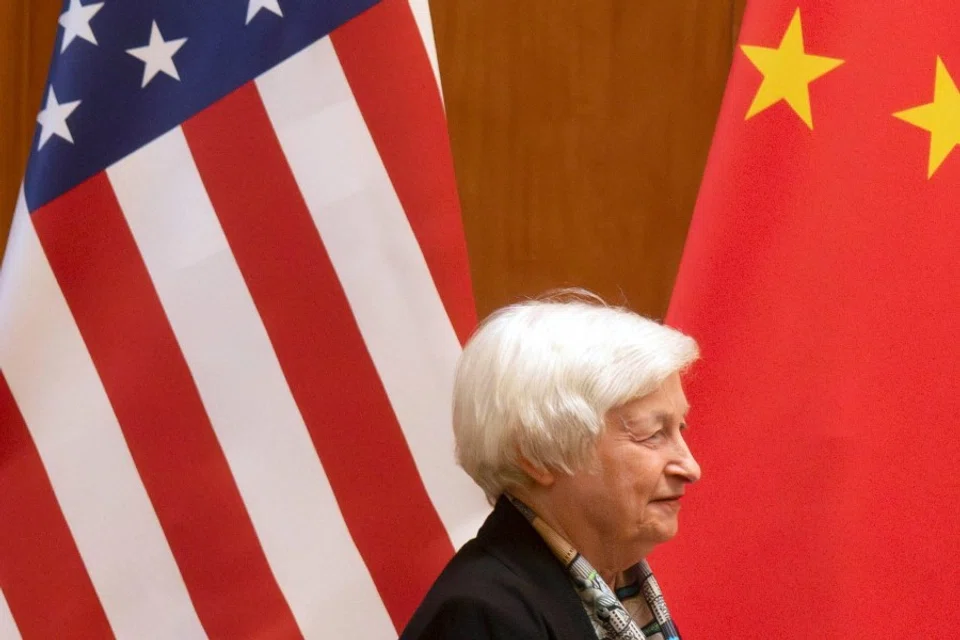Yellen's China visit: Foundations laid but little scope for cooperation
US Treasury Secretary Janet Yellen's visit to China was generally positive, and paves the way for future exchanges. However, while Yellen described the meetings with Chinese officials as "direct, substantive and productive", it remains to be seen how far they will go in improving relations between the US and China.

At the end of her four-day visit to China, US Treasury Secretary Janet Yellen said though "the US and China have significant disagreements", her meetings helped move the relationship towards "surer footing". She added that Washington did not see China-US relations through the frame of great power conflict, and that decoupling would be "disastrous for both countries and destabilising for the world".
Academics Lianhe Zaobao spoke to said that while Yellen's visit laid the foundations for the next step in US-China interactions, there was limited space and leeway for cooperation between the two sides.
Talking despite disagreements
At a press conference on 9 July before leaving Beijing, Yellen candidly acknowledged that "the US and China have significant disagreements". However, she stressed: "But President Biden and I do not see the relationship between the US and China through the frame of great power conflict. We believe that the world is big enough for both of our countries to thrive."

During her visit, Yellen held bilateral talks lasting up to ten hours with several top Chinese officials, including Premier Li Qiang, Vice-Premier He Lifeng, Minister of Finance Liu Kun, and party secretary of the People's Bank of China (PBOC) Pan Gongsheng. She also met with PBOC governor Yi Gang, and former Vice-Premier Liu He, who still holds influence in the Chinese economic field.
Yellen described these meetings as "direct, substantive and productive", and had put US-China ties on a "surer footing."
She said that the US has no wish to decouple from China, explaining the important distinction between decoupling and diversifying critical supply chains or taking targeted national security actions. The US also would not want to see a fragmented global economy or to force countries to take sides.
The economic disagreements between China and the US remain significant.
Despite Yellen's positive assessment of her communications with top Chinese officials at the press conference, she did not announce any breakthroughs that could mend the rift between the two countries.

The economic disagreements between China and the US remain significant. Yellen expressed concern about China's unfair economic practices and coercive actions against American firms, adding that the US would continue to take necessary targeted actions to protect its national security interests and those of its allies.
Motivated by national security, not economic gain
But she stressed, "Importantly, these actions are motivated by straightforward national security considerations. They are not used by us to gain economic advantage."
"... It is still too early to say how many problems can be solved... That depends on the political will of both sides." - Professor Wu Xinbo, Fudan University
On the other hand, Beijing reiterated that it opposed Washington's approach to maintaining national security through trade restrictions. After the five-hour meeting between Yellen and He, Chinese state media Xinhua News Agency emphasised that "the overstretching of national security does no good to the normal economic and trade exchanges".

Yellen is the second key member of Biden's Cabinet to visit China in a month, following US Secretary of State Antony Blinken. This is also part of the Biden administration's efforts to advance communication with Beijing.
Communication alone not enough
Professor Wu Xinbo, dean of Fudan University's Institute of International Studies, told Lianhe Zaobao that Yellen's visit to China made it possible for a substantive exchange between the American and Chinese economic and trade teams to happen, helping both sides better understand each other's views and laying the groundwork for the next step of interaction.
"But communication alone is meaningless. Problems still need to be solved. It is still too early to say how many problems can be solved... That depends on the political will of both sides," he added straightforwardly.
China and the US have a myriad of problems to address and resolve, including climate cooperation, tariffs as well as high-tech and investment restrictions. US special presidential envoy for climate John Kerry is expected to visit China in mid-July, while US Commerce Secretary Gina Raimondo is considering a trip to China in the near future.

Wang Jiangyu, a law professor at the City University of Hong Kong, thinks that the US hopes to explain its intentions through these communications to develop a narrative and persuade China not to take drastic countermeasures.
But in his pessimistic view, the US's domestic political climate and established strategy for China make it difficult for Washington to muster the substantive will to work with Beijing. China is unlikely to make unilateral concessions either. Therefore, "there is actually no space or room for cooperation between both sides".
This article was first published in Lianhe Zaobao as "学者:耶伦访华为中美下一步互动打下基础 但双方合作空间不大".





![[Photos] Fact versus fiction: The portrayal of WWII anti-Japanese martyrs in Taiwan](https://cassette.sphdigital.com.sg/image/thinkchina/3494f8bd481870f7c65b881fd21a3fd733f573f23232376e39c532a2c7593cbc)